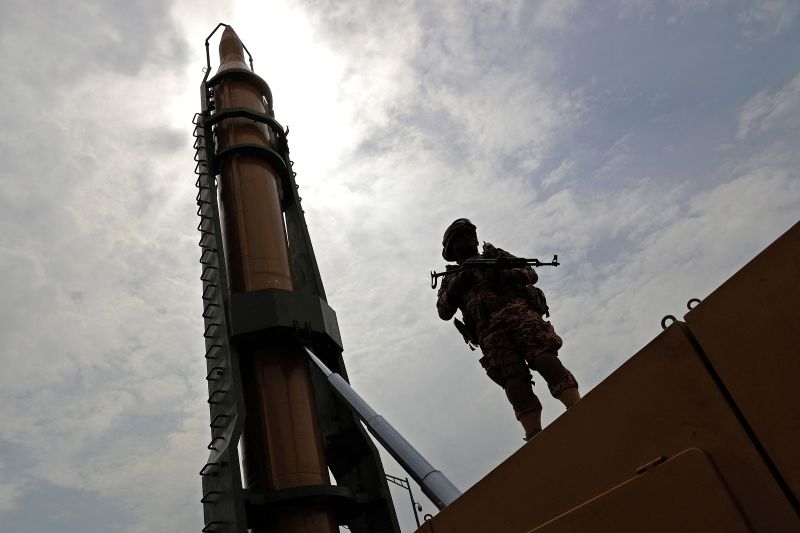US warned of ‘imminent’ attack on Israel hours before Iranian missile barrage
The one common message throughout US government departments has been expressing total support for Israel.
It was also said, both from the Pentagon and the State Department, as well as the White House, that there was constant coordination between the US and Israel prior to and during the Iranian attack.
It was confirmed, too, by President Biden that the US did participate in the defence [of Israel] by firing missile interceptors from US destroyers, which are in the region.
So massive US involvement.
One interesting point is that the US announced that an attack was imminent a few hours before the attack actually began. Now there has been no comment from the US as to how it got that information.
Several US figures have insisted that they did not get prior warning from Iran. This is something that has been claimed by Iranian sources. But both the State Department and National Security Spokesman Jake Sullivan have made very clear that they received no warning – that is according to them.
So the general message across the US is complete support for Israel and very little comment about the consequences of this attack.
What have Israeli leaders said about a potential response to Iran?
Israeli leaders have promised a harsh response to Iran’s missile attack against the country.
- PM Netanyahu says Iran made a “big mistake” and would “pay” for the attack.
- Israeli military spokesman Daniel Hagari has called the attack a “severe and dangerous escalation” that would be met with a response “at the place and time” of Israel’s choosing.
- Defence Minister Yoav Gallant says Iran “has not learned a lesson — those who attack the State of Israel pay a heavy price”.
- Israel’s ambassador to the United Nations, Danny Danon, has warned Iran that it would “soon feel the consequences of their actions” and that Israel’s response would be “painful”.
- Foreign Minister Israel Katz says the attack crossed a “red line” and that Israel would not “remain silent”.
- Opposition leader Yair Lapid says in a social media post that Israel is strong and “will win”.
- Far-right Finance Minister Bezalel Smotrich says that “like Gaza, Hezbollah and the state of Lebanon, Iran will regret the moment”.
- Former Israeli Prime Minister Naftali Bennett calls Iran’s attacks the “greatest opportunity in 50 years” to change the dynamics of the Middle East by moving to “destroy Iran’s nuclear program, its central energy facilities”.
Iranian Shahab-3 series missiles likely used in attack on Israel, experts say
An Iranian soldier stands next to an Iranian Shahab-3 missile in Tehran, Iran on April 29, 2022
Variants of the Iranian Shahab-3 series ballistic missiles were used in the latest missile attack on Israel, weapons experts who analyzed verified social media videos from the scene told CNN.
Trevor Ball, a former senior explosive ordnance technician for the US Army, told CNN that fragments consistent with Shahab-3 variants such as Emad or Ghadr, were identifiable from images and videos of the attack. In one video, debris of a booster with visible markings of an Emad missile was visible, according to Ball. Different models such as the Kheibar Shekan or, less likely, a Fattah could also have been used, he added.
The Shahab-3 is the foundation for all Iran’s medium-range ballistic missiles using a liquid-propellant, according to Patrick Senft, a research coordinator at Armament Research Services (ARES). “It is most likely based on a North Korean missile which itself is probably based on the Soviet-designed Scud missiles. The Shahab-3 was the first Iranian ballistic missile that could reach Israel,” he added.
Remnants of an Iranian ballistic missile, including the guidance section and the warhead, were visible in images and videos collected by CNN at the site of a rocket attack at a Shalhavot Chabad School in Gedera, according to both Ball and Senft. It is difficult to identify the exact model due to the lack of reference images, Ball said.
"Overall, such medium-range ballistic missiles don’t leave behind a lot of diagnostic fragments if they function as intended,” Senft also added.
Regarding claims that Iran used its Fattah 1 hypersonic missile for the first time during its attack on Israel, weapons experts expressed skepticism.
“It’s one of their newest ballistic missiles, and they have a lot to lose from using it,” Ball said. “Israel would get an idea of its capabilities just from being used. There’s also the chance it could fail to function, giving Israel an even greater idea of its capabilities. They get free propaganda and risk nothing by saying it was used.”




















